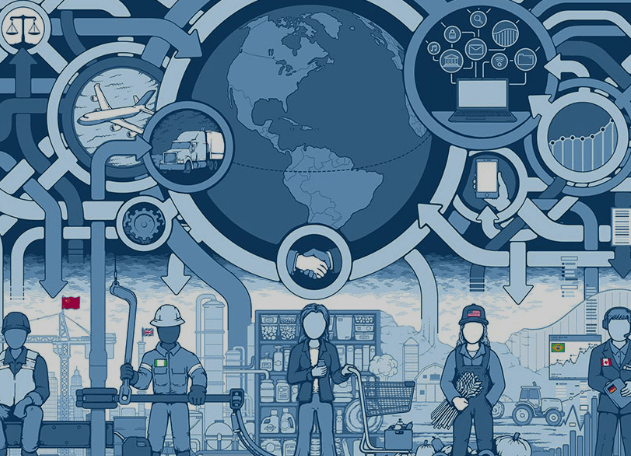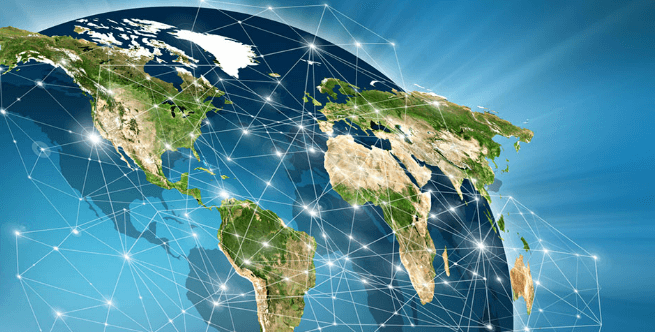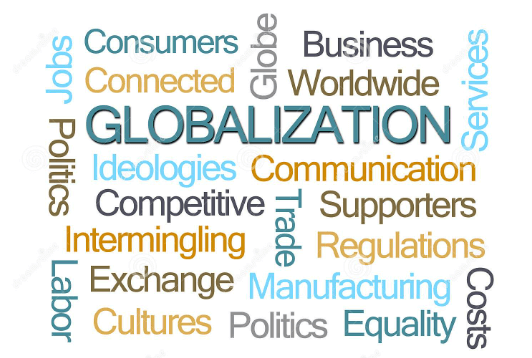Globalization DefinitionThe speeding up of international interactions and movements is known as globalization (of people, things, services, money, technologies, or cultural norms). One effect of globalization is promoting and encouraging relationships across various societies and locales worldwide. 
According to the WHO, globalization is "the increasing interconnection and interdependence of peoples and countries. "It is generally accepted that it consists of two interconnected components: the opening of international boundaries to an increase in the speed of flows of people, ideas, finances, and things; and adjustments to national and international institutions and policies that support or enable such flows. The Economic Impact of Globalization?The Council for Development Policy, a branch of the United Nations, states that the economics of globalization are as follows: The interdependence of world economies is facilitated by the rising level of cross-border trade in products and services, the movement of capital across borders, and the rapid and widespread spread of technology. The two fundamental forces behind economic globalization are marketization, the ongoing expansion and mutual integration of market barriers, and the steadily rising significance of information in all facets of productive activity. The G20 and globalization: What is the G20?The G20, established in 1999, brings together the largest industrialized and developing nations to discuss maintaining financial and economic stability worldwide. The G20 comprises the governments and central bankers of 20 countries, including the European Union (EU). The G20 nations account for over two-thirds of the global population, almost all global trade, and over 80% of global economic output. G20 leaders meet annually for a summit to coordinate efforts to address urgent global issues of shared concern. Though the main topics of each summit's agenda are typically trade and economics, other recurring concerns include terrorism, climate change, immigration laws, the future of employment, and global wealth. Since the G20 leaders are the "political backbone of the global financial architecture that secures open markets, orderly capital flows, and a safety net for difficult countries," significant international agreements are frequently reached during summits thanks to bilateral meetings." As a result, globalization can advance. Thanks to reducing trade barriers and the execution of significant financial reforms, the G20 leaders' coordinated action helped save the world's financial system during the 2008/2009 crisis. Despite this, the G20 has needed help coordinating monetary and fiscal policies and has yet to address corruption and tax evasion, among other negative effects of globalization. Popular nationalist movements worldwide have been arguing that nations should pursue their interests alone or establish successful coalitions due to this and other failures by the G20 to coordinate globalization. How Can Globalization Be Made More Just?Countries' ability to look beyond their limited interests has resulted in unparalleled economic prosperity and good scientific advancement. Only some people, nevertheless, have benefited equally from globalization and technological advancement for various reasons: Unfair wealth distribution and high environmental costs were associated with economic expansion. How can nations put aside their interests and work together to create a fairer society and a healthier planet? How do we make the world more just? The former head of the International Monetary Fund, Christine Lagarde, asserts that "debates about trade and access to foreign goods are as old as society itself," and that history teaches us that adopting protectionism policies or closing borders is not the best course of action because many nations that have tried it have failed. According to Lagarde, we should seek globalization strategies that maximize the benefits of integration and openness while minimizing their drawbacks. It is a difficult subject that includes restructuring economic systems: how to make globalization more just. Yet how? The query is that. Globalization is closely linked to economic systems and markets, which impact and are affected by social problems, difficult-to-overcome cultural barriers, regional differences, the timing of actions, and cooperative networks. Apart from a clear definition of the adverb "just," this necessitates international agreement, cooperation, and nation-specific answers. When did Globalization First Start? Background on GlobalizationFor some, this universal occurrence is part of what makes humans human. Because of this, some claim that globalization started at the beginning of human history, some 60,000 years ago. The amount of trade that human cultures exchange has increased over time. Different civilizations have experienced cultural exchanges and the development of commercial trade routes since ancient times. 
Additionally, these population swaps have been facilitated by migratory phenomena. Particularly now that travel is speedier, more pleasant, and more accessible. This pattern has persisted historically, particularly during military victories and exploration endeavors. Globalization accelerated, though, once communications and transportation technologies advanced. The term "globalization" became commonly used, particularly after the second half of the 20th century, as global trade increased and picked up speed. Illustrations of Globalization (Concept Map)We frequently consider globalization an economic and financial phenomenon due to trade developments and financial exchanges. However, it covers more than just the flow of products, services, or cash. Some examples of globalization, sometimes referred to as the globalization idea map, include:
Advantages of Globalization
The benefits of globalization can be found in numerous fields. It increased cultural interactions and simultaneously developed economies everywhere. Additionally, it permitted financial transactions between businesses, shifting the nature of work. Today, a large number of people call the world home. Geographical distance is no longer an obstacle for many services to occur, and the origin of items has become less important. Investigate further. An Economic Example of the Globalization EngineThe effects of globalization on the economic world are undoubtedly the most obvious. Trade and economic exchanges have increased significantly due to globalization, but financial exchanges have also multiplied. Globalization was intensified in the 1970s by opening world economies and the emergence of free trade laws. The value of global exports surged 33-fold between 1950 and 2010. This had a big impact on growing global relationships between diverse regions. Strong global economic growth has resulted from this acceleration of economic exchanges. Additionally, it promoted quick global industrialization that led to the rapid development of many modern goods and technologies. Sharing knowledge became simple, and international collaboration among the best brains sped up the process. Some researchers claim that globalization has greatly improved world economic circumstances and increased economic riches (this was unequally distributed - more information ahead). Benefits of Globalization: A Financial ExampleThe globalization of finance occurred at the same time. The neoliberal policies of the 1980s propelled the opening of the financial world. The infamous "3D Policy," which stands for disintermediation, decommissioning, and deregulation, was implemented by many states, most notably the US under Ronald Reagan and the UK under Margaret Thatcher. The goal was to remove intermediaries, streamline financial rules, and lower barriers between global financial hubs. Additionally, the objective was to facilitate capital transfers among global financial participants. Globalization: A Case Study in CultureThere has undoubtedly been cultural globalization in addition to economic and financial globalization. Indeed, a rise in human exchanges like migration, expulsion, or travel has coincided with the expansion of economic and financial exchanges. These human interactions have influenced the growth of cultural exchanges. This demonstrates how many customs and traditions that smaller communities share had migrated to other communities that (before) had diverse customs and beliefs. Trading goods like coffee or avocados is one good illustration of cultural globalization. In the Arabid region, coffee is claimed to have origins in Ethiopia. However, because of economic exchanges that began in the 11th century, it is now recognized as a commodity consumed worldwide. For example, avocados are primarily grown in Mexico, the Dominican Republic, or Peru, which have tropical climates. Guacamole and avocado toast were made in modest amounts to serve the local inhabitants, but today they are staples of cuisine worldwide. At the same time, the advancement of the digital age and the power of the internet have made books, movies, and music instantly accessible everywhere in the world. These may be the main factors influencing how quickly cultural exchanges and globalization occur. Other examples of tradition-related globalization include the Brazilian Carnival, Indian Holi Festival, and Black Friday in the US. They were first developed following their respective nations' particular customs and beliefs. Still, as the world recognizes them, they have also become accepted traditions in other nations. Why is Globalization a Problem? Effects of Globalization That are NegativeThe phenomenon of globalization is complicated. As a result, it significantly affects several aspects of modern societies. Let's examine some of the biggest adverse repercussions of globalization thus far. Globalization's Harmful Effects on Cultural LossAside from all its advantages for fostering cross-cultural interchange, globalization also tended to homogenize cultures worldwide. Because of this, certain countries' distinctive cultural traits are vanishing. Languages, customs, or even particular businesses. As a result, according to UNESCO, a careful balance between the benefits of globalization and the preservation of the diversity of local cultures is required. The Harmful Effects of Globalization on the EconomyDespite its advantages, the globalization-driven economic boom has been subject to controversy. The effects of globalization are not uniform; they include economic disparities, unequal wealth distribution, and trades that benefit various parties in diverse ways. Certain actors (countries, businesses, and people) profit more from globalization than others and are occasionally seen as its "losers", which is one of the complaints made at the conclusion. In fact, according to a recent Oxfam analysis, 1% of the world's population owns 82% of the wealth created globally. Globalization's Harmful Effects on the EnvironmentAdditionally, a lot of detractors have cited how globalization harms the environment. As a result, the huge transportation expansion that has served as the foundation for globalization is also to blame for grave environmental issues like greenhouse gas emissions, global warming, and air pollution. Global economic expansion and increased industrial productivity are the main causes of globalization and its main effects. They also have enormously detrimental environmental effects since they fuel the destruction of ecosystems, logging, natural resources, and biodiversity. A significant rubbish issue is caused by the global distribution of commodities, particularly plastic pollution. The Conclusion:In practically every country, living conditions have greatly improved as globalization has advanced (especially when assessed by broader well-being metrics). The advanced nations, rather than all the emerging nations, have experienced the greatest gains. It is alarming that the income gap between high-income and low-income countries has widened. Furthermore, the number of people living in extreme poverty worldwide is horrifying. But it is erroneous to conclude that globalization has caused the divergence or that nothing can be done to remedy the situation. Contrarily, low-income nations have yet to be able to integrate into the global economy as quickly as others, in part due to the policies they have chosen and in part due to external circumstances. Every nation, especially the poorest, can only afford to stay cut off from the global economy. Every country should endeavor to reduce poverty. The international community should work to support the poorest nations' integration into the global economy, faster economic growth, and reduction of poverty through trade, aid, and a strengthened international financial system. That will guarantee that everyone in every nation has access to the advantages of globalization.
Next TopicHistory Definition
|
 For Videos Join Our Youtube Channel: Join Now
For Videos Join Our Youtube Channel: Join Now
Feedback
- Send your Feedback to [email protected]
Help Others, Please Share










